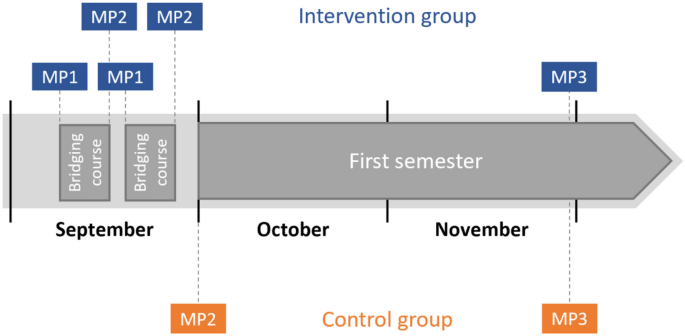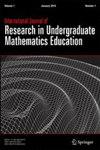Impact of a Mathematics Bridging Course on the Motivation and Learning Skills of University Students
IF 1.8
Q2 EDUCATION & EDUCATIONAL RESEARCH
International Journal of Research in Undergraduate Mathematics Education
Pub Date : 2023-09-25
DOI:10.1007/s40753-023-00224-0
引用次数: 0
Abstract
Abstract The transition from secondary to tertiary education is an exciting and yet challenging event in the educational biography of students. During this transition, students often meet with unexpected challenges, which may cause them to drop out from their degree program. Many universities offer bridging courses or longer-term interventions to support their incoming students in this period. To examine the effect of a bridging course designed to reduce gaps in prior mathematical knowledge, promote social-emotional well-being, and foster learning skills, we implement a repeated-measures intervention study. We analyze the outcomes of the intervention, which features tutors with special training, autonomous choice of topic areas, peer learning, and materials for self-directed learning. We measure the development of motivational beliefs reflecting the will to learn (achievement goals, satisfaction of basic psychological needs, implicit theories, self-efficacy) and the skills to learn (reactions to errors, self-regulated learning) at the secondary-tertiary transition. These aspects are captured at multiple measurement points among students (N = 679) who participate in the bridging course (intervention group) and those who do not (control group). The intervention boosts motivational beliefs related to social embeddedness and learning skills in the short term. The observed decrease in autonomy, competence, and self-efficacy might be explained by higher standards that students use for their self-assessment in the new peer group. In the long term, all aspects of the will to learn, except for social relatedness, show stable to strongly negative developments in both groups. Among those students who do not participate in the bridging course, mostly strongly negative developments are observed. The results suggest that the peer tutoring strategy is highly effective and the need for longer-term interventions to uphold the positive short-term effects.

数学桥接课程对大学生学习动机和学习技能的影响
在学生的教育历程中,从中学到高等教育的转变是一个令人兴奋但又充满挑战的事件。在这个转变过程中,学生们经常会遇到意想不到的挑战,这可能会导致他们从学位课程中退学。许多大学提供过渡课程或长期干预,以支持他们的新生在这一时期。为了检验旨在减少先前数学知识差距、促进社会情感健康和培养学习技能的衔接课程的效果,我们实施了一项重复测量干预研究。我们分析了干预的结果,其中包括经过特殊培训的教师,自主选择主题领域,同伴学习和自主学习的材料。我们测量了反映学习意愿(成就目标、基本心理需求的满足、内隐理论、自我效能感)和学习技能(错误反应、自我调节学习)在二级-三级过渡阶段的动机信念的发展。这些方面在参加了桥梁课程(干预组)和没有参加桥梁课程(对照组)的学生(N = 679)的多个测点上被捕获。干预在短期内促进了与社会嵌入性和学习技能相关的动机信念。观察到的自主性、能力和自我效能的下降可能是由于学生在新的同伴群体中使用更高的自我评估标准。从长期来看,除了社会关系外,学习意愿的所有方面在两组中都表现出稳定到强烈的消极发展。在那些没有参加过桥课程的学生中,大多数观察到强烈的负面发展。结果表明,同伴辅导策略是非常有效的,需要长期的干预来维持积极的短期效果。
本文章由计算机程序翻译,如有差异,请以英文原文为准。
求助全文
约1分钟内获得全文
求助全文
来源期刊

International Journal of Research in Undergraduate Mathematics Education
EDUCATION & EDUCATIONAL RESEARCH-
CiteScore
2.90
自引率
20.00%
发文量
41
期刊介绍:
The International Journal of Research in Undergraduate Mathematics Education is dedicated to the interests of post secondary mathematics learning and teaching. It welcomes original research, including empirical, theoretical, and methodological reports of learning and teaching of undergraduate and graduate students.The journal contains insights on mathematics education from introductory courses such as calculus to higher level courses such as linear algebra, all the way through advanced courses in analysis and abstract algebra. It is also a venue for research that focuses on graduate level mathematics teaching and learning as well as research that examines how mathematicians go about their professional practice. In addition, the journal is an outlet for the publication of mathematics education research conducted in other tertiary settings, such as technical and community colleges. It provides the intellectual foundation for improving university mathematics teaching and learning and it will address specific problems in the secondary-tertiary transition. The journal contains original research reports in post-secondary mathematics. Empirical reports must be theoretically and methodologically rigorous. Manuscripts describing theoretical and methodological advances are also welcome.
 求助内容:
求助内容: 应助结果提醒方式:
应助结果提醒方式:


